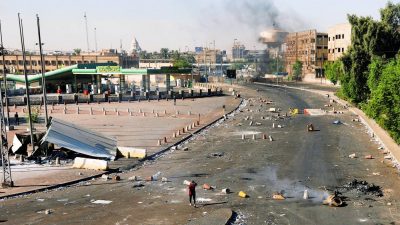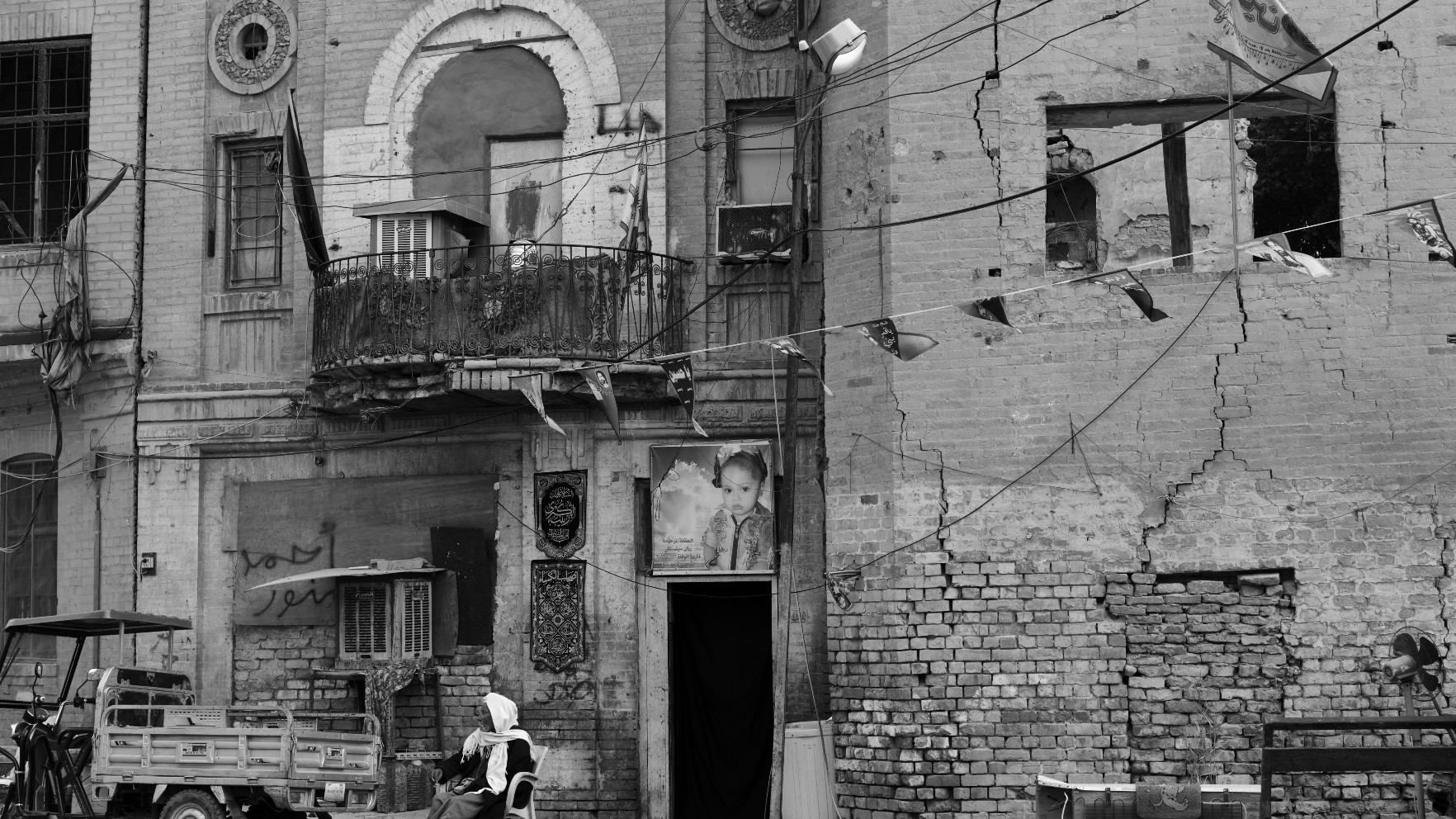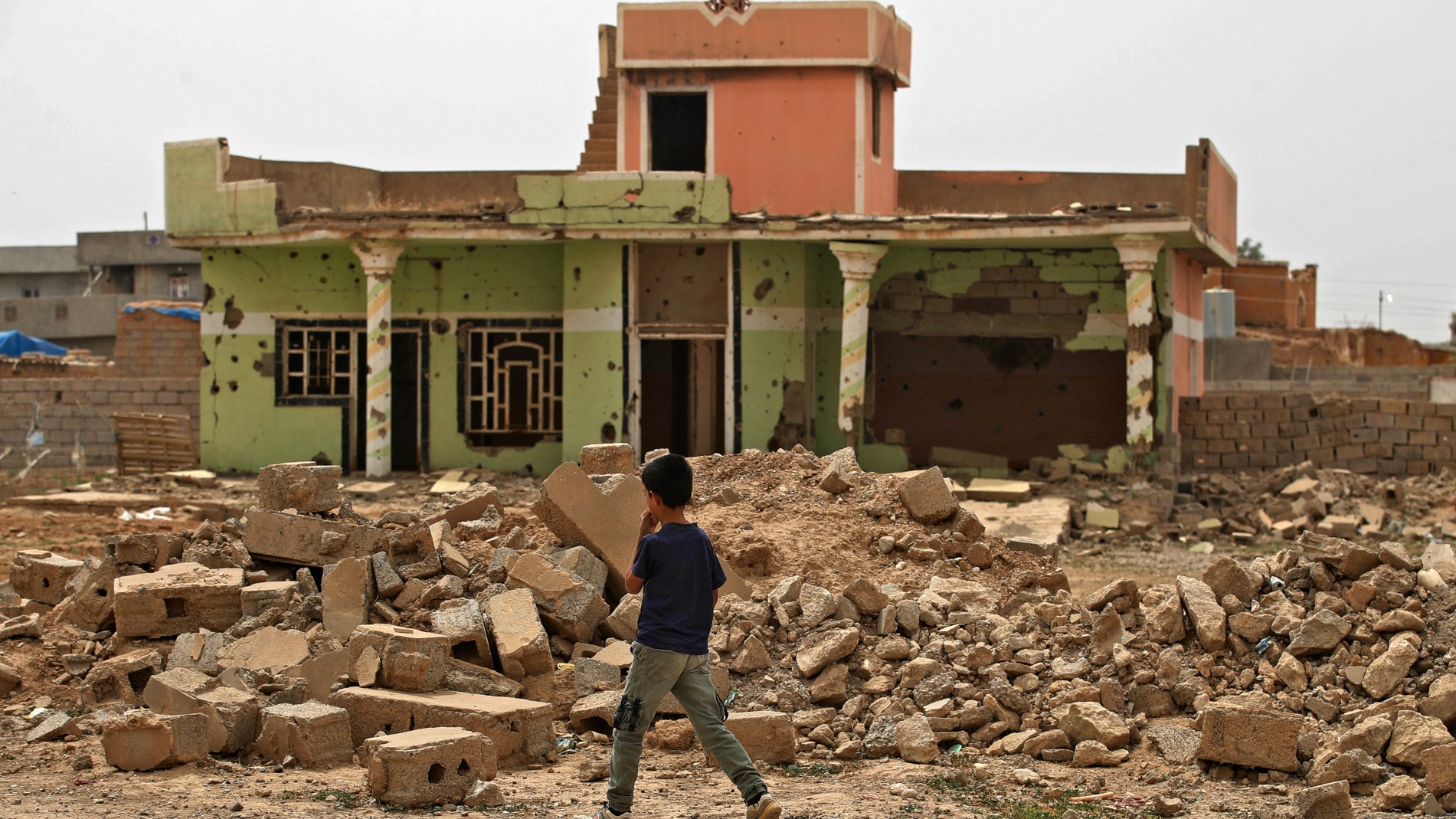As Bush Jokes about War, I Walk among the Ruins of Baghdad

All Global Research articles can be read in 51 languages by activating the “Translate Website” drop down menu on the top banner of our home page (Desktop version).
To receive Global Research’s Daily Newsletter (selected articles), click here.
Visit and follow us on Instagram, Twitter and Facebook. Feel free to repost and share widely Global Research articles.
***

That was me hallucinating a few years ago in Baghdad. Tonight, a candle sits on a table in my rented Virginia apartment. Its flame performs a death dance to the blues of a Tom Waits song rising from the coffin of deceased years: “The bats are in the belfry / The dew is on the moor / Where are the arms that held me / And pledged her love before?”
The men inside seem perplexed, sitting quietly in plastic chairs, immersed in grief as if in a funeral not for the dead, but for the living
In Baghdad, my mother rebuked me when she climbed the stairs and plunged into the thicket of smoke clouding the second story of our residence. Waits was no good for me, she would say, nor were Cuban cigars.
But she knew the reason behind my solitude was to mourn Baghdad, an ailing metropolis I wished not to meet at times, choosing instead to hide in my study like a hermit. I would be content in the company of a vintage Badr Shakir al-Sayyab book, whose pages the late poet traversed with a crutch on his way to the gates of hell: “Open it, and feed my body to the fire!”
My mother is gone now. She left our world days before I jumped on a plane headed for Washington, DC, to study at Georgetown University. Al-Sayyab is dead too, and I hear voices tonight. I hear the voices of pain that Palestinian poet Mahmoud Darwish heard howling at him like a siren from afar: “Come, come to me!”
Deafening silence
I heed, blindly. I know the beaten roads of memory like many Iraqis do – a rusted metal door always left ajar for us, squeaking in the deafening silence of exile. I step onto its threshold, my eyes wide open to see in the dark. Someone sobs in a dim corner inside. “I am in the right place,” I tell myself. I make my way to the edges of Baghdad from afar.
I see a scorched horizon cloaked in a starless night, not a sound but a distant wailing. A shepherd chuckles in the midst of a herd of sheep dying of thirst and hunger. “Why are you laughing?” I ask in astonishment. “Go and ask them,” he growls, discarding my question.
Elegant westerners and diaspora Arabs, armed with cameras and sunscreen tubes, descending from the ornate balconies of western academia to investigate the field for stardom, disembark from tourist buses en masse.
“The fire burns, but they ask me: ‘Are you Sunni or Shia?’” the shepherd tells me, before falling in a swoon, laughing and crying hysterically. “Shocking!” one visitor exclaims in bewilderment.
“Let’s go to Sadr City, I hear it’s a shithole,” another snaps emphatically. “Yes, that’s why I chose aid! Let’s fix a few lives now,” the former says, rubbing his hands in excitement.
Another white tourist turns to look at me and says: “Are you a fixer? We need someone to show us the big stories. We pay but don’t expect a byline.”
I leave the demagogues revelling in the scene, ecstatic, drooling about the promise of their booty, and make my way into the city streets in the dark.
Death all around
I find Baghdad desolate, choked in dust and smoke, its skin lacerated with an overgrowth of barbed-wire fences. The soldiers manning its walls drowse in a siesta, unbothered by the screams coming from the dim alleys behind them.
Someone is dying. Someone is always dying in Iraq. Two hundred and sixty is the number of those killed so far this year, says Iraq Body Count. Those who miss the bullets leap in the Euphrates, along with their emaciated children. Any there is better than here.
I see the palm trees thirsty, many decapitated and dead. No bougainvillea dangles over fences, like necklaces caressing dewy necks of Baghdadi women in early spring. No kids play barefoot on the streets. The then where they once knew laughter has been stabbed to death by the hands of time – repeatedly.
Baghdad still feels like a crime scene. As I make my way among its ruins, the words of al-Sayyab echo inside my head: “Is this my city?” These ruins with “Long Live Life!” painted on the walls in the blood of its murdered?
Dreading what I might see where I grew up, I decide to avoid the streets of my childhood and visit the downtown area instead.
I remember the famous teahouses of al-Rashid Street. The sound of stirring in a glass of cardamom tea was music to my ears. A dice always rolls on an aging backgammon board. Eternal Umm Kulthum heartbreaks are always put on repeat, undulating tunes that slip from the salons to the sidewalks outside, where sad-eyed ladies amble and dodge a line (“they said there’s no flour in the market, where’s this cake coming from?”) from a mischievous student.
But the cafes are noiseless. The men inside seem perplexed, sitting quietly in plastic chairs, immersed in grief as if in a funeral not for the dead, but for the living. On one muted TV screen, celebratory headlines accompany enemies’ torn limbs, assailing the psyches of bewildered clientele. A report then heralds the imminent death of the Tigris and the Euphrates.
The men look on. No dice shall roll tonight.
Lifetime of limbo
The only sign of light in the city centre comes from a police patrol on al-Mutanabbi Street. I stand in a corner and watch where a mob of tourists have swarmed. Social media influencers, on a two-day escapade from Dubai, pose for the camera in the “homeland”: “How beautiful Baghdad is!” one says, before returning to the Babylon Hotel on Abu Nawas Street in a Cadillac SUV.
The mayor stands nearby, giving one interview after another, boasting of a renaissance that entails hanging kitsch posters of Iraqi artist Kadhim Haider’s paintings on power poles and sweating over it on social media.
No word on the traditional shanasheel houses collapsing in the nearby wretched alleyways of Jadid Hasan Pasha and al-Hayder Khana. The child beggars and the godforsaken porters who crisscross traffic threads in daytime are also sentenced to a lifetime in the cellar of limbo.
They, too, have their scrutinising gazes fixed on the wrecked humans wallowing in seas of misery
I leave in haste, passing an elderly man diving to his waist in a dumpster outside the telecommunications tower that bears the imprint of late architect Rifat al-Chadirji. The building was almost toppled by liberatory rockets in 2003, before Chadirji died and a former British ambassador expressed his condolences on social media as if war(s) never happened.
As I walk, I remember the labyrinthine alleyways, or darabin, of Bab al-Sheikh and Qanbar Ali. In previous visits, old women who crouch on their doorsteps would welcome me like their offspring. They would show me directions and pray for me long after I disappeared into the next alley, where children would chase after me in glee, blow me kisses and hug me for showing them their portraits on my camera.
I decide to go there. But I find Bab al-Sheikh deserted. In Qanbar Ali, blood and sewage stagnate in the gutters. Walls tremble. An old man, crouching in a dark corner, awaits the last US air raid to level the alley. From the windows, I see children hang themselves of hunger in damp living rooms. There is no breaking news on live TV.
Smouldering past
A hole widens in my chest. I suffocate. I meander my way to the Tigris in hopes of fresh air. But even there, in the gardens of Abu Nawas Street, women count the floating corpses passing by, and weep in silence.
This is it – “this is the storm we call progress”, the ghost of Walter Benjaminwhispers in my ears. The catastrophe perched on Iraq’s chest still piles wreckage upon wreckage over a smouldering past, and the storm propels us into the arms of a future born with an incurable birth defect.
A rocket flies across the Tigris and slams into a building inside the fortified Green Zone on the opposite, western bank, disrupting my thoughts. But everything seems normal there.
Diaspora Iraqi scholars, dressed in fine suits, pose for the camera next to their favourite politicians. Afterwards, they doze off in the fine al-Rashid Hotel, whose windows offer no view of the city’s godforsaken alleys, nor the grieving women sobbing on the river bank.
As I walk the streets of Baghdad, I see the menacing faces of Saddam Hussein’s many imitators painted and plastered on the same walls that once carried the dictator’s. They, too, have their scrutinising gazes fixed on the wrecked humans wallowing in seas of misery, looking over their shoulders for the trigger-men of the new, this-time-Iran-backed fedayeen.
Amnesiac audience
Like a fugitive, I flee the streets of memory, chased by the rabid dogs of my trauma. My footsteps race my breath. Behind me, Baghdad is engulfed by monstrous dust storms. In the dark, I almost stumble on a new corpse of a man who looks familiar. I look closely; it’s the shepherd. The soldiers manning the city walls are still asleep.
Next to his corpse sits a small radio announcing the evening news: “Former Prime Minister Nouri al-Maliki cuts the ribbon at the opening of the Baghdad book fair.” I make my way out of the rusted door, and slam it shut.
In my Virginia apartment, I look for a source of distraction. Nothing more banal and distracting than US TV channels, I tell myself. But Iraqi poet Sinan Antoon knew before me, “surfing the channels is like rummaging in old garbage”.
I soon find former US President George W Bush’s face on every station, preaching on war and peace in Ukraine to an amnesiac audience. He slips and mentions Iraq. He jokes about it, and the audience laughs.



